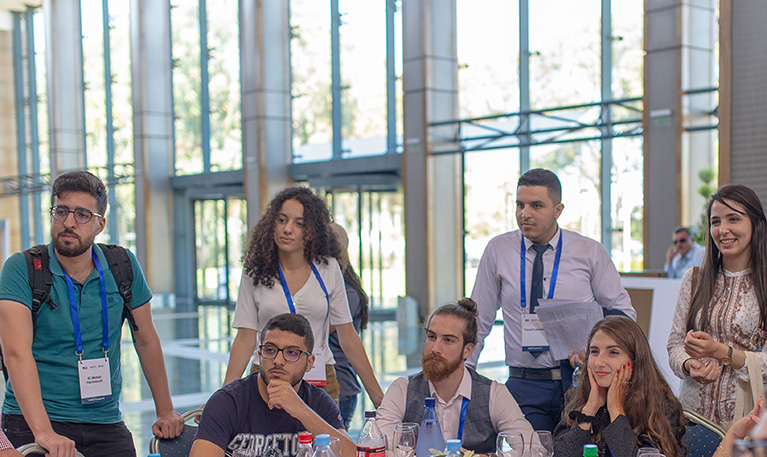Three takeaways from three years of implementing the MEPI Alumni Connection Program

In cooperation with the U.S.-Middle East Partnership Initiative (MEPI), IREX launched the MEPI Alumni Connection in 2017 to develop an active alumni network that fosters long-lasting relationships and opportunities to stimulate social and business entrepreneurship across the Middle East and North Africa (MENA). Results of a midline survey conducted in 2020, show that MEPI activities have supported alumni to thrive as leaders and significant change makers in their communities.
In 2020, IREX conducted a midline evaluation to better understand how alumni’s lives changed since completing their MEPI leadership programs and through their engagement in the MEPI alumni network. The survey was administered online and garnered 408 valid responses (roughly 25% of the alumni network). Here are three things we’ve learned through our midline evaluation:
1. MEPI Alumni are Getting Jobs and Sparking Economic Prosperity for Others
At the time of the midline survey, roughly 74% of MEPI alumni were gainfully employed, even while employment across the region and world decreased due to the onset of the COVID-19 pandemic. Among the alumni surveyed, 14% reported occupying entry level positions, 27% mid-level positions, and 24% held executive level positions in various fields across the public and private sector.
Beyond securing their own employment, 38% of MEPI alumni also reported contributing to economic prosperity for others by starting their own businesses and organizations. For example, one alum started a non-profit organization to reinforce youth skills, by offering workshops and competitions addressing topics such as self-confidence, emotional intelligence, mentorship, critical thinking, and teamwork. These entities strengthen communities, providing necessary goods, services, and resources, all while providing employment where such opportunities remain scarce.
MEPI leadership programming proved valuable for alumni to connect and collaborate. When asked, 37% of alumni said they met the person with whom they started their business or organization through their MEPI program or the alumni network.
2. MEPI Alumni are Champions of Community Engagement and Civil Rights
Roughly 56% of MEPI alumni conducted at least one project in the two years leading up to the survey. Respondents estimated that more than 140,000 individuals had benefited from their projects across the MENA region. The MEPI Alumni Connection strives to support alumni in their altruistic ambitions and does so by offering alumni small grants to start community projects or found initiatives. As of summer 2021, the MEPI Alumni Connection had supported alumni with 116 project grants.
These projects include activities related to youth, civic engagement, education, gender equality, and social inclusion. Through campaigns to end cyberbullying; teaching women entrepreneurs photography skills so that they can better market their products; or forming a professional body to help coordinate the humanitarian response in Yemen, alumni are using these funds to transform lives.
Many alumni also work with existing networks, particularly in civil society. In fact, 41% of alumni collaborated with civil society organizations to promote awareness of an issue between June 2019 and June 2020. From 2018 to 2020, alumni led over 1,400 events and activities to raise awareness of an issue.
3. MEPI Alumni are Giving Back by Sharing What They Learn
As part of their experience with the MEPI Alumni Connection, alumni have access to mentoring, training, and professional development opportunities ranging from networking events or discussions to courses in digital storytelling or information literacy.
Alumni routinely share what they learn with others in their communities. Thirty-two percent (32%) of alumni reported sharing what they learned through their MEPI experiences with family and another 23% reported sharing what they learned with other MEPI alumni. In one instance, a MEPI alum who took part in an artificial intelligence and data analytics program at the University of Chicago conducted a webinar where she shared what she learned in her program with other MEPI alumni.
Alumni also share knowledge by practicing what they learn. Alumni model leadership approaches and impart leadership skills through their behavior and practices, contributing to the development of more leaders in their homes, communities, or workplaces. When asked how they are using what they learned through MEPI in their current professional roles, alumni expressed outcomes including, “focus[ing] more on the importance of communication. I find myself advising on and implementing team activities that make us closer and stronger” or “[always] viewing the other side of the story.”
These trends among alumni underscore that, much like financial support, non-monetary investments benefit more than just alumni. Training one alum is tantamount to training multiple individuals at once. The midline assessment shows that investing in community leaders and young professionals impacts countless others, ensuring that the dividends on these investments pay out in communities across the Middle East and North Africa.
The evaluation consisted of the following 13 assessments:
- Algeria Report and One Pager (PDF, 4.61 MB)
- Gulf Countries (PDF, 2.45 MB)
- Iraq Report (PDF, 2.43 MB)
- Israel Report (PDF, 1.17 MB)
- Jordan Report (PDF, 783 KB)
- Lebanon Report (PDF, 1.59 MB)
- Morocco Report (PDF, 2.43 MB)
- Syria Report (PDF, 1.45 MB)
- Tunisia Report (PDF, 3.22 MB)
- Yemen Report (PDF, 2.26 MB)
- Leadership Development Fellowship 2020 Survey Report (PDF, 904 KB)
- Midline Impact Report (PDF, 503 KB)
- Student Leaders Program 2020 Survey Report (PDF, 1.10 MB)
- Tomorrow’s Leaders Program 2020 Survey Report (PDF, 1.60 MB)
These assessments are made possible through the MEPI Alumni Connection, a program of the U.S.-Middle East Partnership Initiative (MEPI) of the U.S. Department of State (DoS) and implemented by IREX. The opinions expressed herein are those of the authors and do not necessarily reflect the views of the United States Government.